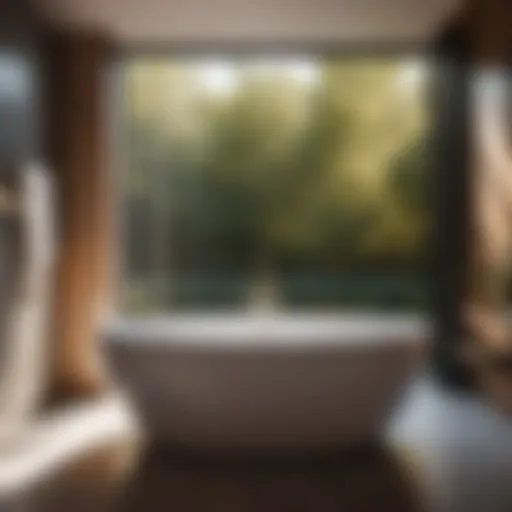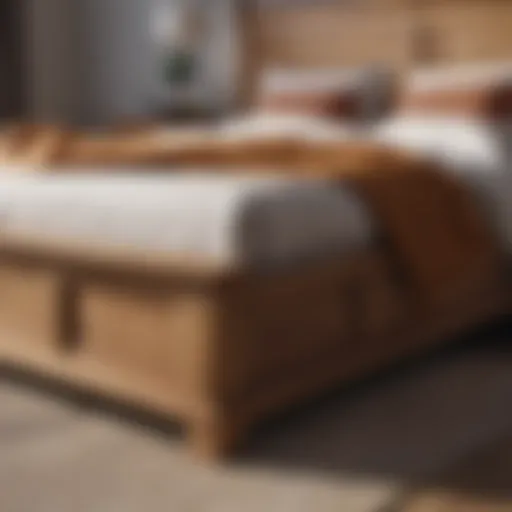Selecting the Ideal Material for Your Bathroom Vanity Top: A Comprehensive Guide
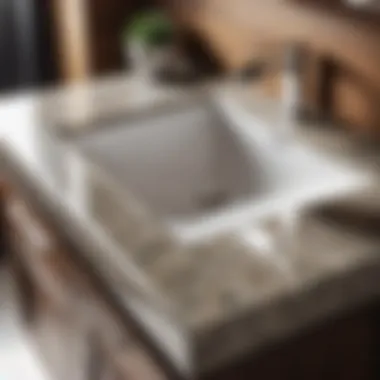

Materials:
- Granite: 4 feet x 6 feet, polished surface for a sleek finish
- Marble: 3 feet x 5 feet, veining patterns add elegance
- Quartz: 2 feet x 4 feet, durable and low maintenance
- Solid Surface: 5 feet x 7 feet, seamless design options
DIY Steps:
- Measure the vanity dimensions precisely to determine the required material size.
- Select the material that aligns with your style preferences and budget.
- Cut the material to fit the vanity, ensuring precise angles and edges.
- Smooth the surface for a seamless application that enhances aesthetics.
Technical Aspects:
- Tools: Measuring tape, circular saw, adhesive, sandpaper
- Timing: Allow 1-2 days for installation, depending on material complexity
- Techniques: Use waterjet cutting for intricate designs, apply sealant for longevity
DIY Project Process:
- Start by placing the material over the vanity to confirm fit before securing.
- Apply adhesive evenly on both surfaces and press the material firmly into place.
- Smooth out any air bubbles and let the adhesive set as per manufacturer's instructions.
- Fine-tune edges and corners for a flawless finish that complements your bathroom decor.
Troubleshooting Tips:
- If the material doesn't fit precisely, trim with a saw for accurate alignment.
- In case of adhesive seepage, clean with a mild solvent to maintain a clean appearance.
Introduction
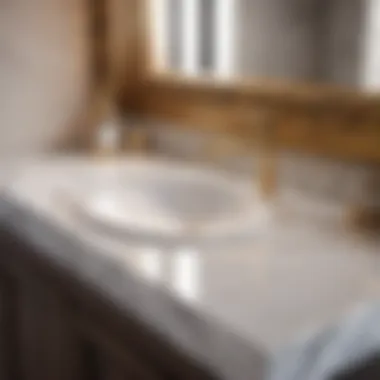

In the realm of bathroom design and renovation, one of the key focal points that can significantly enhance the overall aesthetics and functionality of the space is the choice of material for the vanity top. Choosing the right material for your bathroom vanity top is a decision that requires careful consideration, as it not only impacts the durability and maintenance of the surface but also plays a vital role in setting the tone for the entire bathroom ambiance. This article aims to delve deep into the diverse array of materials available for bathroom vanity tops, providing a detailed exploration of their unique characteristics, advantages, and drawbacks. By dissecting crucial factors such as durability, aesthetics, maintenance requirements, and cost implications, readers will be empowered to make well-informed decisions when selecting the most suitable material for their bathroom vanity tops.
When embarking on a bathroom renovation or remodeling project, the choice of material for the vanity top is a significant starting point. It is essential to understand that the vanity top not only serves as a practical surface for daily use but also contributes to the overall visual appeal and style of the bathroom. The material selected can influence the longevity of the vanity top, its resistance to wear and tear, as well as the ease of maintenance. Therefore, a thoughtful evaluation of the various aspects of different materials is imperative to ensure that the final decision aligns with both functional requirements and aesthetic preferences. With a plethora of options available in the market, ranging from natural stones like granite and marble to engineered stone such as quartz, each material offers a distinct set of characteristics that cater to different needs and preferences.
Factors to Consider
When it comes to selecting the best material for your bathroom vanity top, several factors need careful consideration to ensure you make the right choice. Understanding the importance of durability, aesthetics, maintenance requirements, and cost is crucial in this decision-making process. Each of these factors plays a significant role in determining the longevity, appearance, upkeep, and financial implications of your chosen vanity top material. By delving deep into these core considerations, you can make an informed decision that aligns with your preferences and lifestyle.
Durability
Durability is a key factor to consider when choosing a material for your bathroom vanity top. Different materials offer varying levels of durability, impacting their lifespan and resistance to everyday wear and tear.
Granite
Granite is renowned for its exceptional durability, making it a popular choice for bathroom vanity tops. Its natural strength and heat resistance make it highly suitable for withstanding the demands of a bathroom environment. The key characteristic of granite lies in its robust nature, capable of enduring regular use without succumbing to scratches or damage easily. Despite its durability, granite may require periodic resealing to maintain its pristine condition.
Marble
Marble exudes elegance and luxury, but it is slightly less durable than granite. While marble is renowned for its beauty and unique veining patterns, it is more susceptible to scratches and staining compared to granite. Careful maintenance and regular sealing are essential to preserve marble vanity tops' longevity and appearance.
Quartz
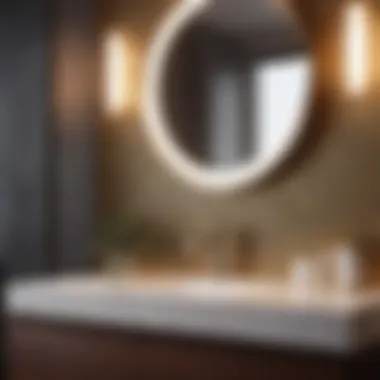

Quartz combines durability with versatility, offering a non-porous surface that resists scratches, stains, and bacterial growth. Its engineered composition provides a wide range of colors and patterns while maintaining excellent durability. Quartz requires minimal maintenance, making it a practical and long-lasting choice for bathroom vanity tops.
Solid Surface
Solid surface materials like Corian and Hi-Macs offer durable options for vanity tops. Resistant to stains, chipping, and bacteria, solid surfaces provide a seamless look with integrated sinks and customizable designs. While solid surfaces are durable, they may require occasional repairs for any minor damages.
Laminate
Laminate vanity tops provide a budget-friendly option but are less durable than natural or engineered stone materials. While laminate offers a range of designs and colors, it is more prone to scratches, heat damage, and water exposure. Regular care and maintenance are essential to extend the lifespan of laminate vanity tops.
In summary, the durability of a vanity top material significantly impacts its longevity and resilience against daily use and environmental factors. Consider your priorities and maintenance preferences when choosing a material that balances durability with aesthetic appeal.
Options for Vanity Top Materials
Natural Stone
Natural stone materials, such as granite and marble, are popular choices for vanity tops due to their timeless elegance and durability.
Granite
Granite is known for its exceptional strength and durability, making it a practical choice for high-traffic bathrooms. Its natural beauty, characterized by unique patterns and colors, adds a touch of luxury to any space. Granite is heat and scratch-resistant, ensuring longevity with proper care. While it may require sealing to prevent staining, its durability and aesthetic appeal make it a favored option for those seeking a premium vanity top material.
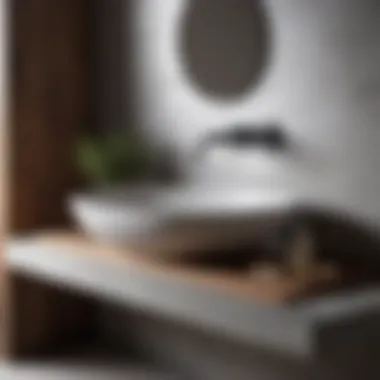

Marble
Marble exudes sophistication and charm with its classic veining patterns and delicate hues. Though not as hard as granite, marble offers a luxurious aesthetic that elevates the ambiance of any bathroom. Its distinctive appearance creates a sense of opulence, perfect for adding a touch of luxury to your space. However, marble is more prone to scratching and staining, requiring regular maintenance to preserve its beauty. While it requires more care compared to granite, the timeless appeal of marble makes it a sought-after choice for those seeking a lavish vanity top.
Engineered Stone
Engineered stone, such as quartz, combines natural quartz crystals with resins to create a durable and low-maintenance vanity top material. Offering a wide range of colors and patterns, quartz provides a versatile option that mimics the look of natural stone without the same level of maintenance. Its non-porous surface resists staining and bacteria growth, making it a hygienic choice for bathrooms. The durability and ease of care of quartz make it a popular option for homeowners seeking a blend of functionality and aesthetics.
Solid Surfaces
Solid surface materials like Corian and Hi-Macs offer seamless vanity top solutions that are both practical and customizable. These non-porous materials come in a variety of colors and designs, allowing for seamless integration of sinks and backsplashes. Corian boasts a soft, smooth texture and is resistant to scratches and stains, while Hi-Macs offers a harder surface with similar benefits. Both materials are easy to clean and maintain, making them ideal choices for busy households looking for a sleek and modern vanity top.
Laminate
Laminate provides a budget-friendly alternative for those looking to achieve a stylish vanity top without breaking the bank. While not as durable as natural or engineered stone, laminate offers a variety of patterns and colors to suit different design preferences. Easy to install and replace, laminate vanity tops are a practical choice for those on a tight budget or looking to update their bathroom's aesthetic periodically.
Conclusion
In the realm of selecting the ideal material for your bathroom vanity top, the conclusion serves as the pivotal moment where all considerations converge to determine the best course of action for your specific needs and preferences. It acts as the guiding light that consolidates the array of factors discussed throughout this comprehensive guide, including durability, aesthetics, maintenance, and cost. Through the lens of the conclusion, readers are poised to make a well-informed decision that harmoniously combines practicality with aesthetics.
One of the primary aspects underscored in the conclusion is the essence of balance. It encapsulates the essence of achieving a symbiotic relationship between durability and aesthetics. Understanding the equilibrium between these two facets is crucial to crafting a vanity top that not only withstands the test of time but also exudes visual appeal. Whether opting for the timeless elegance of granite or the sleek sophistication of quartz, the conclusion prompts individuals to strike a harmonious balance between functionality and beauty.
Moreover, the conclusion sheds light on the significance of maintenance considerations. By emphasizing the importance of regular cleaning, resealing, and being prepared for potential repairs, the conclusion underscores the commitment required to preserve the longevity and aesthetic appeal of the chosen vanity top material. Readers are encouraged to factor in maintenance requirements as a vital component of their decision-making process to ensure the longevity of their investment.
Another pivotal element addressed in the conclusion revolves around cost implications. While the initial investment outlay may vary across different materials, the long-term expenses associated with maintenance and repairs play a crucial role in the overall cost consideration. The conclusion guides readers to adopt a holistic perspective, weighing both immediate and future expenses to arrive at a financially prudent decision that aligns with their budgetary constraints.
In essence, the conclusion of this article serves as the compass that navigates readers through the intricate landscape of selecting the best material for their bathroom vanity top. By synthesizing durability, aesthetics, maintenance, and cost considerations into a cohesive directive, the conclusion empowers individuals to transform their bathroom spaces into sanctuaries of both functionality and beauty.





